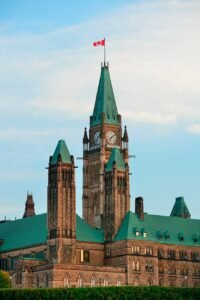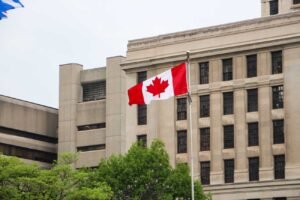Border and Customs British Columbia
- Like most countries, Canada has requirements and restrictions on goods such as firearms, animals and animal products, endangered species and fresh fruit and vegetables, as well as certain food and drug products.
- Goods for your personal use whilst in Canada – including clothing, stereos, cameras, tape recorders, personal computers, sporting equipment, boats and outboard motors – are exempt from duties and taxes, provided you declare them to Revenue Canada (Customs) when entering the country and they are exported when you leave Canada.
- Visitors aged 19 years or over may bring in 50 cigars, 200 cigarettes and 200g (7 oz.) of manufactured tobacco. The alcoholic beverage allowance permits the import of 1.14 litres (40 oz) of spirits or wine, or 24 x 355 ml (12 oz) bottles/cans of beer or ale, providing it is to be used for personal consumption. If you bring in more than these quantities, you will have to pay federal duties and provincial fees and taxes when you enter Canada.
- Gifts: You can bring gifts for relatives and friends, duty free, if each gift is valued at $60 Cdn or less. If the value of the gift is more than $60 Cdn, you may have to pay duties and taxes. You cannot bring tobacco and alcohol products as gifts.
- Goods “in transit” (but not handguns) may be brought through Canada by Americans seeking a convenient route to other parts of the mainland US or Alaska. To facilitate your border crossings, you should carry 3 copies of a list of all the goods you are bringing with you, including values and serial numbers where applicable. Consumable goods, such as alcohol, tobacco and food, should be packed in containers that can be corded and sealed by Canada Customs at the time of entry.
- Endangered Species: Trade in endangered or threatened species of fauna and flora is strictly controlled by an import/export system. Be sure to determine what rules and regulations apply before bringing animals or plant products into Canada.
- All plant material must be declared to Canada Customs at the point of entry. Authority to import plant material from all countries must be obtained in advance. Many agricultural items are restricted or prohibited entry to Canada.
For more information on customs regulations call:
Canada Customs and Revenue Agency
Regional Information Unit
Tel: 1-800-461-9999
Tel: 204-983-3500 from outside Canada.
Border and Customs British Columbia: Endangered Species
Many species of animals and plants are in danger of extinction because of excessive hunting and commercial exploitation. The Convention on International Trade in Endangered Species (CITES) is an international agreement that protects endangered and threatened species of animals and plants from over-exploitation by regulating the international trade in these products.
Since 1973 more than 120 countries, including Canada, have signed the CITES agreement. These countries are working together to protect thousands of the world’s most endangered and threatened species. In Canada, CITES is administered by the Canadian Wildlife Service of Environment Canada and enforced by Canada Customs and the Royal Canadian Mounted Police (RCMP).
CITES operates through an import/export permit system that is stricter for more endangered species. If you already own a plant, animal or product that is listed by CITES, and want to take it into or out of Canada, you require a CITES temporary trade certificate when entering or leaving the country.
If an animal or plant is listed by CITES, then that includes not only live specimens, but any part or product derived from the species. Before you bring an animal, plant or product into Canada, be sure you know what rules and regulations apply.
Obtain all necessary permits before importing or exporting the species or product. If you import endangered species without the necessary permits you may be subject to prosecution.
Help conservation by refusing to purchase endangered species and their products. Removing the market is the most effective way to stop the illegal trade in endangered species.
For more information on endangered species, contact:
Environment Canada
Wildlife Enforcement Section
Pacific & Yukon Region
5421 Robertson Rd, RR #1
Delta, BC V4K 3N2
Tel: 604-940-4710
Fax: 604-946-8359
Border and Customs British Columbia : Firearms & Weapons
In Canada, it’s against the law to bring firearms or other weapons such as mace and pepper spray into the country for your personal protection. You can usually bring rifles and shotguns for hunting purposes. All firearms and personal protection devices (i.e. stun guns, mace, and pepper spray) must be declared upon entry into Canada.
Non-restricted firearms may be imported for the following reasons only:
- for sporting or hunting use while in Canada
- for use in competitions
- for an in-transit movement through Canada; or
- for a person’s protection against wildlife in remote areas of Canada (excluding National parks) as long as the Customs officer is satisfied that the circumstances warrant the firearm being imported.
- No permit or certificate is required.
Restricted weapons may only be imported for the purpose of attending an approved shooting competition in Canada. A temporary Permit to Carry is required.
Generally, Canadian police agencies will not issue a permit allowing restricted firearms to move in transit through Canada. Any restricted firearms may be shipped in bond via commercial carrier to the person’s destination.
Transporting Firearms: Canadian regulations require that all types of firearms be transported unloaded. If firearms are transported in a vehicle, they must be kept out of sight and in a part of the vehicle which is kept locked (the trunk, if there is one), unless the vehicle is supervised by an adult. Restricted weapons have to be equipped with locked safety devices that will prevent the weapons from firing. In addition, they have to be transported in a locked case.
For more Information on importing firearms and weapons, contact:
Border and Customs British Columbia
Canada Customs and Revenue Agency
333 Dunsmuir Street
Vancouver
B.C. V6B 5R4
Telephone: 604-666-0545
Hunting is prohibited in Canada’s national and provincial parks, game reserves, and adjacent areas, therefore firearms are forbidden in many of these areas. Federal, provincial and territorial laws govern hunting in Canada. Persons intending to hunt in Canada must obtain a hunting licence from each province or territory in which they plan to hunt.
Certificates and permit requirements:
Canadian Firearm Centre
Northwest Region
Suite 400, 152nd Street
Surrey, BC V3R 0Y3
Toll Free: 1-800-731-4000 ext. 9530
Telephone: 604-586-2562
Fax: 604-586-2572
Border and Customs British Columbia: Pets
All pets must be accompanied by their owners when entering Canada. Dogs and cats entering from the US must be accompanied by a certificate signed by a licensed Canadian or US veterinarian certifying that the pet has been vaccinated against rabies during the preceding 36 months. An exception is made for puppies or kittens that are younger than three months old.
For information and permits contact:
Canadian Food Inspection Agency (CFIA)
Import Services Centre
Tel: 1-800-835-4486
Border and Customs British Columbia: Plant Material
Canada is a nation of valuable resources whose economy is based largely on agriculture. At present, Canada remains relatively free of many of the world’s worst threats to agriculture. Any insect or disease outbreak would cost billions of dollars to control. Be aware that many agricultural items are restricted or prohibited entry to Canada. These products may carry bacteria, viruses or pests that could spell disaster for Canada’s agricultural industry. At some locations specially trained dogs are used to sniff out agricultural products concealed in luggage. Smuggling agricultural items into Canada is a federal offence and can lead to prosecution.
All plant material must be declared to Canada border and Customs at the point of entry. Authority to import plant material from all countries must be obtained in advance. A health certificate from the country of origin must accompany most imported plants, with the exception of houseplants originating from the continental US. Visitors may take plants of Canadian origin into the US, with certain exceptions, provided a plant health certificate accompanies the plants.
Application for import permits for plant material should be addressed to:
Plant Protection Division
Camelot Court
59 Camelot Drive
Nepean
Ontario, K1A 0Y9
Tel: 613-952-8000
Fax: 613-943-1252.
Authority to import fruits, vegetables and meats from all countries must be obtained in advance.
For information and permits contact:
Canadian Food Inspection Agency (CFIA)
Import Services Centre
Tel: 1-800-835-4486
Border and Customs : Visas & Immigration
Entry is usually granted for six months unless otherwise indicated in writing. Citizens or permanent residents of the US do not need passports or visas to enter Canada, but proof of citizenship such as a birth certificate, voter’s registration, or baptismal certificate must be carried. Proof of residence, such as a driver’s licence, should also be carried. At least one ID card with a photo must be carried. US permanent residents should carry their Resident Alien Cards (Green Card). Temporary residents of the U.S need a passport for travel to Canada and may also require a visitor’s visa.
All other persons entering Canada as visitors must be in possession of a valid national passport or other recognized travel document. Citizens of some countries also need visas to enter Canada. Visa applications and enquiries must be made at a Canadian embassy, consulate or mission outside of Canada. Visas are not available at the border or airport.
Travellers with children should carry identification for each child as required for adults. Divorced parents with shared custody rights should carry legal documents establishing their status. A letter of permission from the parents of any children accompanying travellers (for whom they do not have legal custody) must be carried.
Visitors to Canada must:
- not have a criminal record – this includes convictions for driving while intoxicated (DUI);
- have enough money to support themselves and their dependants during their stay;
- not pose a health risk; and
- be willing and have the means to leave Canada and go to another country.
For more information visit: Citizenship and Immigration Canada
Border Wait Times: Crossing Canada-United States land border.
Border and Customs British Columbia: Temporary Resident Permit Canada (TRP)
If an individual is inadmissible to Canada, due to criminal, security or medical reasons, but requires entry to Canada, they may be eligible for a Temporary Resident Permit Canada (TRP). Kindly note that this is not relevant to Temporary Resident Visas (TRV), commonly referred to as a Canadian Visitor Visa. A TRP allows an individual to overcome their inadmissibility for a specified reason and for a specific period of time. More Information.
Go back to main page: https://britishcolumbia.com








